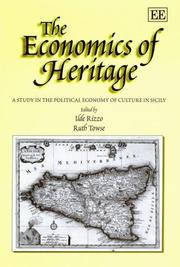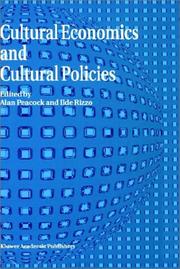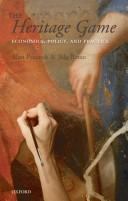| Listing 1 - 10 of 14 | << page >> |
Sort by
|

ISBN: 184376041X Year: 2002 Publisher: Cheltenham, UK ; Northampton, MA : Edward Elgar Pub.,
Abstract | Keywords | Export | Availability | Bookmark
 Loading...
Loading...Choose an application
- Reference Manager
- EndNote
- RefWorks (Direct export to RefWorks)
Cultural property --- Culture --- Politics and culture --- Biens culturels --- Politique et culture --- Economic aspects --- Aspect économique --- Sicily (Italy) --- Sicile (Italie) --- Cultural policy --- Politique culturelle --- Aspect économique --- Cultural policy.

ISBN: 079232868X 9401044996 9401111405 Year: 1994 Publisher: Dordrecht Kluwer
Abstract | Keywords | Export | Availability | Bookmark
 Loading...
Loading...Choose an application
- Reference Manager
- EndNote
- RefWorks (Direct export to RefWorks)
7.078.1 --- Art and state --- Art patronage --- Arts --- -Arts, Fine --- Arts, Occidental --- Arts, Western --- Fine arts --- Humanities --- Arts patronage --- Business patronage of the arts --- Corporations --- Maecenatism --- Patronage of art --- Art and industry --- Art --- Politics and art --- State and art --- Art and society --- Cultural policy --- Education and state --- Kunstpolitiek. Cultuurbeleid. Kunstbevordering door de overheid --- Economic aspects --- Government policy --- -Kunstpolitiek. Cultuurbeleid. Kunstbevordering door de overheid --- 7.078.1 Kunstpolitiek. Cultuurbeleid. Kunstbevordering door de overheid --- -Arts patronage --- Arts, Fine
Book
Abstract | Keywords | Export | Availability | Bookmark
 Loading...
Loading...Choose an application
- Reference Manager
- EndNote
- RefWorks (Direct export to RefWorks)
Cultural property --- 338.78 --- 339.110 --- 339.325.6 --- 351.0 --- 380.1 --- 7 --- AA / International- internationaal --- Cultural heritage --- Cultural patrimony --- Cultural resources --- Heritage property --- National heritage --- National patrimony --- National treasure --- Patrimony, Cultural --- Treasure, National --- Property --- World Heritage areas --- Schone kunsten - Kunst als vrijetijdsbesteding. --- Beaux-arts - Arts d'agrément. --- Fine arts. Art as a way of using leisure. --- 7 Schone kunsten - Kunst als vrijetijdsbesteding. --- 7 Beaux-arts - Arts d'agrément. --- 7 Fine arts. Art as a way of using leisure. --- Economic aspects --- Diensten. Non-profitsector --- Nationaal vermogen: algemeenheden --- Culturele behoeften --- Activiteiten van het openbaar bestuur: algemeenheden --- Waardeleer --- Schone kunsten - Kunst als vrijetijdsbesteding --- Sociology of culture --- Sociology of cultural policy --- Service industry --- Business policy --- Beaux-arts - Arts d'agrément. --- 7 Beaux-arts - Arts d'agrément.
Digital
ISBN: 9783319406374 Year: 2016 Publisher: Cham Springer International Publishing
Abstract | Keywords | Export | Availability | Bookmark
 Loading...
Loading...Choose an application
- Reference Manager
- EndNote
- RefWorks (Direct export to RefWorks)
This book reassesses central topics in cultural economics: Public finance and public choice theory as the basis for decision-making in cultural and media policy, the role of welfare economics in cultural policy, the economics of creative industries, the application of empirical testing to the performing arts and the economics of cultural heritage. Cultural economics has made enormous progress over the last 50 years, to which Alan Peacock made an important contribution. The volume brings together many of the senior figures, whose contributions to the various special fields of cultural economics have been instrumental in the development of the subject, and others reflecting on the subject's progress and assessing its future direction. Alan Peacock has been one of the leading lights of cultural economics and in this volume Ilde Rizzo and Ruth Towse and the other contributors ably capture the import of his contributions in a broader context of political economy. In doing so, they offer an overview of progress in cultural economics over the last forty years. Tyler Cowen, Professor of Economics and Director of the Mecatus Center, George Mason University, United States A fitting tribute to Professor Sir Alan Peacock's inspiring intellect leadership and his outstandingly rich and varied legacy in the domain of cultural economics, this book draws together illuminating analyses and insights from leading cultural economists about the role and value of this dynamic and increasingly policy-relevant field of enquiry. Gillian Doyle, Professor of Media Economics and Director of Centre for Cultural Policy Research, University of Glasgow, UK.
Journalism --- Sociology of culture --- Sociology of cultural policy --- Quantitative methods (economics) --- Methodology of economics --- Economic schools --- Economic policy and planning (general) --- Economics --- Business management --- Business economics --- cultureel erfgoed --- financieel management --- persbeleid --- cultuur --- economie --- economische politiek --- economisch denken
Book
Year: 2016 Publisher: Cham : Springer International Publishing : Imprint: Springer,
Abstract | Keywords | Export | Availability | Bookmark
 Loading...
Loading...Choose an application
- Reference Manager
- EndNote
- RefWorks (Direct export to RefWorks)
This book reassesses central topics in cultural economics: Public finance and public choice theory as the basis for decision-making in cultural and media policy, the role of welfare economics in cultural policy, the economics of creative industries, the application of empirical testing to the performing arts and the economics of cultural heritage. Cultural economics has made enormous progress over the last 50 years, to which Alan Peacock made an important contribution. The volume brings together many of the senior figures, whose contributions to the various special fields of cultural economics have been instrumental in the development of the subject, and others reflecting on the subject's progress and assessing its future direction. Alan Peacock has been one of the leading lights of cultural economics and in this volume Ilde Rizzo and Ruth Towse and the other contributors ably capture the import of his contributions in a broader context of political economy. In doing so, they offer an overview of progress in cultural economics over the last forty years. Tyler Cowen, Professor of Economics and Director of the Mecatus Center, George Mason University, United States A fitting tribute to Professor Sir Alan Peacock's inspiring intellect leadership and his outstandingly rich and varied legacy in the domain of cultural economics, this book draws together illuminating analyses and insights from leading cultural economists about the role and value of this dynamic and increasingly policy-relevant field of enquiry. Gillian Doyle, Professor of Media Economics and Director of Centre for Cultural Policy Research, University of Glasgow, UK.
Book
ISBN: 9780333674185 Year: 1997 Publisher: Basingstoke Palgrave Macmillan
Abstract | Keywords | Export | Availability | Bookmark
 Loading...
Loading...Choose an application
- Reference Manager
- EndNote
- RefWorks (Direct export to RefWorks)
Book
Year: 2016 Publisher: Cham : Springer International Publishing : Imprint: Springer,
Abstract | Keywords | Export | Availability | Bookmark
 Loading...
Loading...Choose an application
- Reference Manager
- EndNote
- RefWorks (Direct export to RefWorks)
This book reassesses central topics in cultural economics: Public finance and public choice theory as the basis for decision-making in cultural and media policy, the role of welfare economics in cultural policy, the economics of creative industries, the application of empirical testing to the performing arts and the economics of cultural heritage. Cultural economics has made enormous progress over the last 50 years, to which Alan Peacock made an important contribution. The volume brings together many of the senior figures, whose contributions to the various special fields of cultural economics have been instrumental in the development of the subject, and others reflecting on the subject's progress and assessing its future direction. Alan Peacock has been one of the leading lights of cultural economics and in this volume Ilde Rizzo and Ruth Towse and the other contributors ably capture the import of his contributions in a broader context of political economy. In doing so, they offer an overview of progress in cultural economics over the last forty years. Tyler Cowen, Professor of Economics and Director of the Mecatus Center, George Mason University, United States A fitting tribute to Professor Sir Alan Peacock's inspiring intellect leadership and his outstandingly rich and varied legacy in the domain of cultural economics, this book draws together illuminating analyses and insights from leading cultural economists about the role and value of this dynamic and increasingly policy-relevant field of enquiry. Gillian Doyle, Professor of Media Economics and Director of Centre for Cultural Policy Research, University of Glasgow, UK.
Book
ISBN: 9780857931009 Year: 2013 Publisher: Cheltenham Edward Elgar
Abstract | Keywords | Export | Availability | Bookmark
 Loading...
Loading...Choose an application
- Reference Manager
- EndNote
- RefWorks (Direct export to RefWorks)
Cultural heritage is a complex and elusive concept, constantly evolving through time, and combining cultural, aesthetic, symbolic, spiritual, historical and economic values. The Handbook on the Economics of Cultural Heritage outlines the contribution of economics to the design and analysis of cultural heritage policies and to addressing issues related to the conservation, management and enhancement of heritage. The Handbook takes a multidisciplinary approach, using cultural economics as a theoretical framework to illustrate how crucial and stimulating cross-disciplinary dialogue actually is. Contributors scrutinise the co-existence of cultural and economic values as well as the new challenges that arise from changes brought about by technology, and relationships between the different actors engaged in the production, distribution and consumption of heritage services. The roles of public, private and non-profit organizations are also explored. Case studies underpin the discussion, demonstrating the clear and vital link between theory and practice. This highly unique Handbook will prove a fascinating and informative read for academics, researchers, students and policymakers with an interest in cultural economics.
Book
Year: 2016 Publisher: Cham : Springer International Publishing : Imprint: Springer,
Abstract | Keywords | Export | Availability | Bookmark
 Loading...
Loading...Choose an application
- Reference Manager
- EndNote
- RefWorks (Direct export to RefWorks)
This book reassesses central topics in cultural economics: Public finance and public choice theory as the basis for decision-making in cultural and media policy, the role of welfare economics in cultural policy, the economics of creative industries, the application of empirical testing to the performing arts and the economics of cultural heritage. Cultural economics has made enormous progress over the last 50 years, to which Alan Peacock made an important contribution. The volume brings together many of the senior figures, whose contributions to the various special fields of cultural economics have been instrumental in the development of the subject, and others reflecting on the subject's progress and assessing its future direction. Alan Peacock has been one of the leading lights of cultural economics and in this volume Ilde Rizzo and Ruth Towse and the other contributors ably capture the import of his contributions in a broader context of political economy. In doing so, they offer an overview of progress in cultural economics over the last forty years. Tyler Cowen, Professor of Economics and Director of the Mecatus Center, George Mason University, United States A fitting tribute to Professor Sir Alan Peacock's inspiring intellect leadership and his outstandingly rich and varied legacy in the domain of cultural economics, this book draws together illuminating analyses and insights from leading cultural economists about the role and value of this dynamic and increasingly policy-relevant field of enquiry. Gillian Doyle, Professor of Media Economics and Director of Centre for Cultural Policy Research, University of Glasgow, UK.

ISBN: 0199213178 9780199213177 Year: 2008 Publisher: Oxford ; New York : Oxford University Press,
Abstract | Keywords | Export | Availability | Bookmark
 Loading...
Loading...Choose an application
- Reference Manager
- EndNote
- RefWorks (Direct export to RefWorks)
Cultural property --- Cultural property --- Protection --- Economic aspects. --- Protection.
| Listing 1 - 10 of 14 | << page >> |
Sort by
|

 Search
Search Feedback
Feedback About UniCat
About UniCat  Help
Help News
News